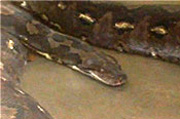
FRIDAY, Jan. 13 (HealthDay News) — Salt water may not stop the spread of Burmese pythons from the Florida Everglades, a new study indicates.
The findings raise concerns that the giant constrictor snakes may invade and cause ecological damage on nearby islands, such as the Florida Keys, said lead author Kristen Hart, a research ecologist with the U.S. Geological Survey (USGS).
The predominately freshwater Everglades are home to the only known wild-breeding population of Burmese pythons in the United States.
“Because reptiles, in general, have poor salinity tolerance, it was hoped that salt water would naturally hinder pythons’ ability to expand their range beyond the Everglades,” Hart said in a USGS news release. “Unfortunately, our results suggest salt water alone cannot act as a reliable barrier to the Everglades python population.”
In lab experiments, the researchers found that hatchling pythons can survive in salt-water environments for between one and five months. Pythons are most vulnerable during the hatchling phase of their life, which means it’s likely adult pythons could survive even longer in such an environment.
“The fact that this study has ruled out one of the most hoped-for forms of physical barriers, salt water, as preventing the spread of invasive pythons in Florida puts even more onus on human action to prevent the spread of these damaging reptiles,” USGS director Marcia McNutt said in the news release. “This study demonstrates the distinct possibility that pythons could spread to new suitable habitats one estuary at a time.”
The study is published in the Feb. 10 issue of the Journal of Experimental Marine Biology and Ecology.
More information
The Nature Conservancy has more about Burmese pythons in the Everglades.

